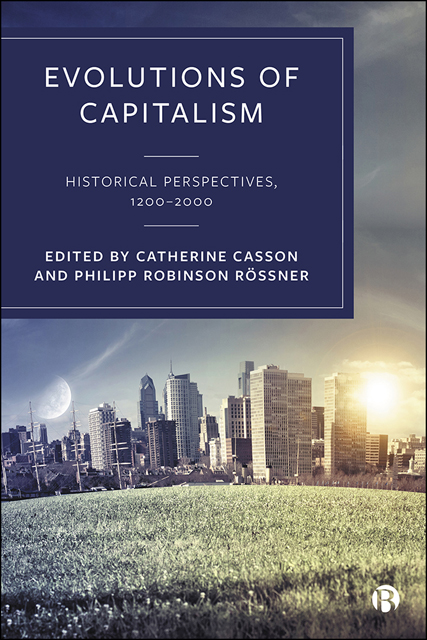Book contents
- Frontmatter
- Contents
- List of Figures and Tables
- Notes on Contributors
- Acknowledgements
- 1 Introduction
- 2 The Market as an Institution: Theory and History
- 3 Regulating Capitalism
- 4 Capitalism and State Ownership Models
- 5 Comparative and Connected Global Capitalism(s)
- 6 Capitalism, Imperialism and the Emergence of an Industrialized Global Economy
- 7 Religion and Capitalism
- 8 Capitalism and the Environment
- 9 Capitalism and Income Inequality
- 10 Conclusion
- Index
7 - Religion and Capitalism
Published online by Cambridge University Press: 13 October 2022
- Frontmatter
- Contents
- List of Figures and Tables
- Notes on Contributors
- Acknowledgements
- 1 Introduction
- 2 The Market as an Institution: Theory and History
- 3 Regulating Capitalism
- 4 Capitalism and State Ownership Models
- 5 Comparative and Connected Global Capitalism(s)
- 6 Capitalism, Imperialism and the Emergence of an Industrialized Global Economy
- 7 Religion and Capitalism
- 8 Capitalism and the Environment
- 9 Capitalism and Income Inequality
- 10 Conclusion
- Index
Summary
Introduction
Like tectonic plates grinding together, the macro-economic social encounters between capitalism and religion have often had seismic effects. Capitalism is defined here as the legal accumulation and distribution of wealth. Across time numerous kinds of capitalism have been tried in most societies and, in contrast to statism, they offer systems that have more often produced economic development. The stages for encounters between capitalism and religion have varied. Some have been regional, national or global; others have been between businesses or within a single firm.
The role of religion in relation to capitalism almost wholly escapes the scope of Beckert's history of global capitalism (Beckert, 2014). Believing in the non-material world and accountability to God gave the religious mind the possibility of distanced, critical, prophetic perspectives on manifestations of capitalism. The laws of Moses and the teaching of Jesus presented capitalist societies with the highest alternative ethical standards. Therefore it might be thought that religion would offer necessary restraints on the excesses of capitalism, whatever the variety. The purpose of this chapter is to examine this assumption.
Religion could be both an obstacle and a spur to capitalist development. Epitomized in the Catholic nunnery, the Ottoman harem, the Hindu zenana, in the daily blessing of the pious Jew (thanks for not being made a Gentile, a slave or a woman) or the Victorian married man's property rights, for centuries most European and Asian societies have been patriarchal, usually with the approval of the dominant religion. Consequently, one of the greatest disservices that religion has done to capitalism until the second half of the 20th century was to deprive capitalist enterprise of half the potential talent in the population: the abilities of women (Weber, 1948: 268– 9, 295– 301; Holcombe, 1983: 23– 6; Watts, 1995: 54– 6; McLeod, 1996: 156– 68; Kuran, 2018: 1349). Religion could also be an apologist for exploitive capitalism. Nowhere was this more evident than in the slave trade in the Atlantic world, an aspect of which is examined later.
The chapter begins by examining the debates surrounding the role of religion in the economic divergence between East and West.
- Type
- Chapter
- Information
- Evolutions of CapitalismHistorical Perspectives, 1200-2000, pp. 156 - 186Publisher: Bristol University PressPrint publication year: 2022

